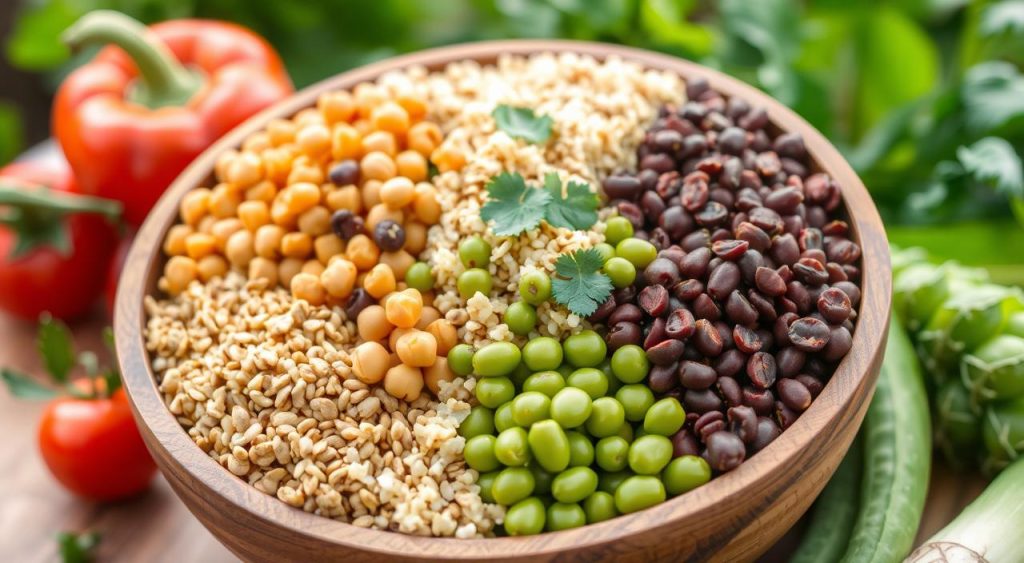We’re excited to share the many benefits of plant-based proteins. They can improve our health and reduce our environmental impact. By learning about these benefits, we can make better choices for our nutrition and lifestyle. Plant-based proteins offer a wide range of advantages for our overall well-being.
In this guide, we’ll look at where plant-based proteins come from and their nutritional value. We’ll also show how easy it is to add them to our diet. Whether you’re already a vegan or just starting out, this guide will help you understand the benefits of plant-based proteins. You’ll learn how to experience these benefits for yourself.
Understanding Plant-Based Proteins: What They Are and Where to Find Them
Exploring plant-based proteins is key to a healthy diet. These proteins help lower heart disease risk and improve digestion. They are also rich in fiber, vitamins, and minerals, making them a great choice for vegans.
Legumes, beans, lentils, tofu, tempeh, and seitan are all good sources of plant proteins. They are not only high in protein but also packed with other nutrients. For instance, legumes are full of fiber, and tofu is a good iron source.
Common Sources of Plant Proteins
- Legumes (lentils, chickpeas, black beans)
- Beans (kidney beans, pinto beans, black beans)
- Tofu and tempeh
- Seitan
- Nuts and seeds (almonds, chia seeds, hemp seeds)
Nutritional Composition of Plant Proteins
Plant proteins vary in nutritional content. Yet, most are high in fiber, vitamins, and minerals. For example, a cup of cooked lentils has 18g of protein, 16g of fiber, and 6g of iron.
| Food | Protein Content | Fiber Content | Iron Content |
| Lentils | 18g | 16g | 6mg |
| Black Beans | 15g | 9g | 3mg |
| Tofu | 20g | 2g | 3mg |
Complete vs Incomplete Proteins Explained
Knowing the difference between complete and incomplete proteins is important. Complete proteins have all nine essential amino acids. Incomplete proteins lack one or more. By mixing different plant proteins, we can get all the amino acids we need.
The Science Behind Plant Protein Absorption
Exploring plant-based nutrition, we learn about plant protein absorption. Plant protein benefits research shows plant proteins work as well as animal proteins. This is great news for those who follow plant-based diets.
Many things affect how well plant proteins are absorbed. The type of protein and how it’s prepared matter a lot. For example, legumes and beans are full of fiber, which helps you feel full and aids digestion.
But, some compounds like phytates and oxalates can slow down protein absorption. Luckily, plant protein benefits research suggests these can be reduced with the right cooking.
To get the most from plant proteins, eat a variety of plant foods. Also, choose the right cooking methods. Here are some important points from plant protein benefits research:
Plant-Based Protein Sources
- Legumes and beans are packed with protein and fiber, perfect for plant-based diets.
- Whole grains like brown rice and quinoa are also good protein sources.
- Nuts and seeds, such as almonds and chia seeds, are rich in healthy fats and protein.
By adding these plant-based foods to our diets and keeping up with plant protein benefits research, we can fully benefit from plant-based nutrition. This supports our health and well-being.
Health Benefits of Switching to Plant-Based Proteins
Protein is key in our diets, but plant-based proteins offer unique benefits. They can improve heart health and help with weight management. A plant-based diet can give you all the protein you need, with many advantages.
Some key benefits of plant-based proteins include:
- Improved cardiovascular health, reducing the risk of heart disease and stroke
- Weight management advantages, including weight loss and maintenance
- Digestive system benefits, such as reduced inflammation and improved gut health
- Anti-inflammatory properties, which can help reduce the risk of chronic diseases
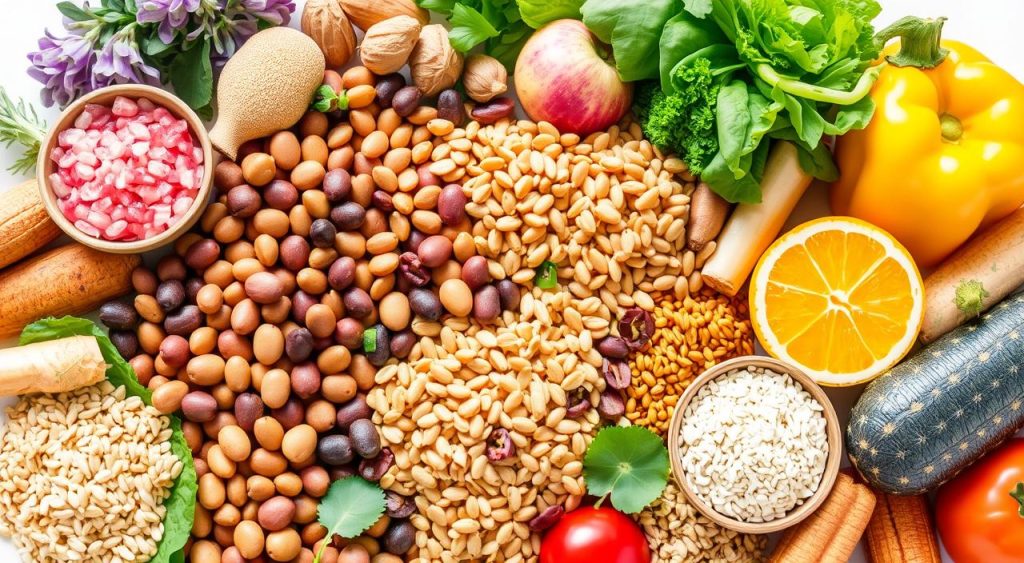
Adding plant-based proteins to your diet can greatly improve your health. The many benefits of plant-based proteins make a plant-based lifestyle increasingly popular.
Environmental Impact of Choosing Plant Proteins
We often talk about the benefits of plant protein diet and how it helps our health. But, our food choices also affect the environment a lot. By picking plant-based proteins, we can lower our carbon footprint and help the planet.
Plant-based proteins have many environmental benefits. They include:
- Reduced greenhouse gas emissions
- Less water pollution
- Decreased deforestation
When we think about the benefits of plant protein diet, we must consider the big picture. Our food choices can help the planet and create a better food system.
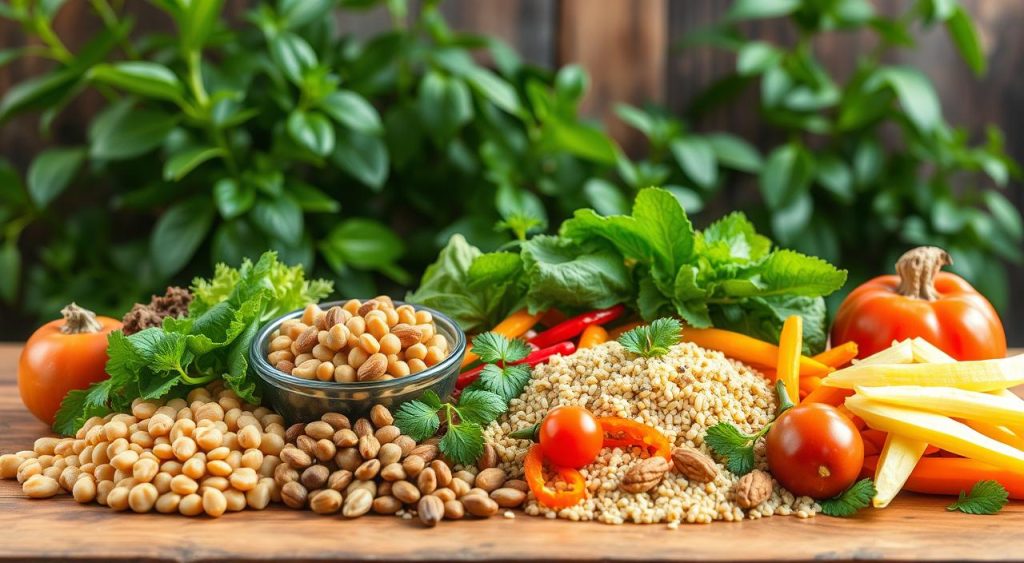
Choosing plant-based proteins is good for both our health and the environment. The benefits of plant protein diet are clear. It’s up to us to make choices that help our planet thrive.
Plant-Based Proteins vs Animal Proteins: A Comparative Look
Choosing between plant-based and animal proteins involves several factors. Looking into plant-based proteins can help us make better diet choices. They offer a sustainable and eco-friendly option.
It’s key to understand the protein quality analysis. This looks at the amino acids and digestibility of different proteins. It shows how plant-based proteins can meet our nutritional needs.
Protein Quality Analysis
- Plant-based proteins can provide all essential amino acids when consumed in combination.
- Animal proteins, on the other hand, often contain higher amounts of saturated fat and cholesterol.
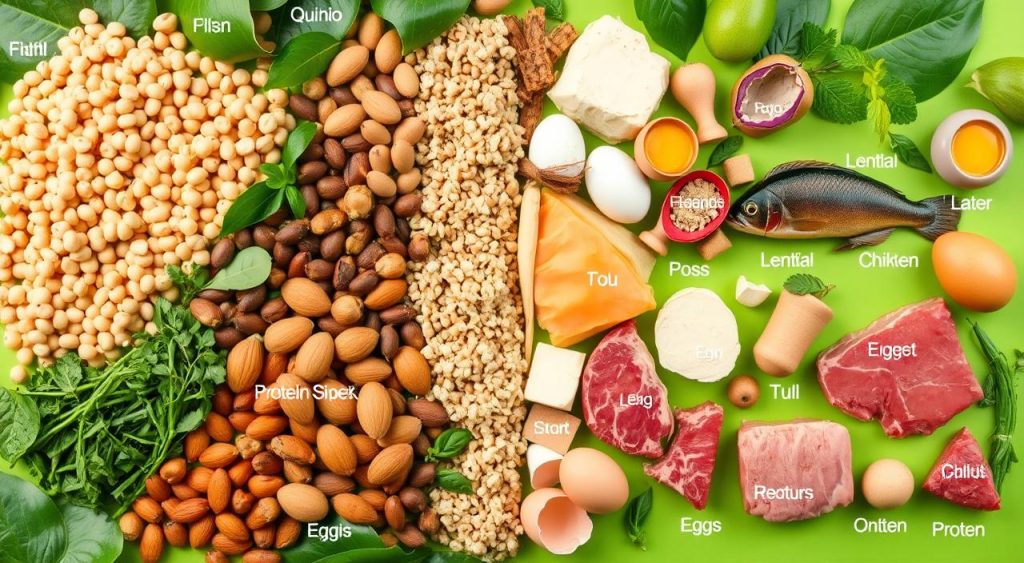
Cost Comparison
Cost is another important factor. Plant-based proteins are often cheaper than animal-based ones. This can help save money in our diets.
Debunking Common Myths About Plant-Based Proteins
We often hear wrong ideas about plant-based proteins. One myth is that they are incomplete and lack essential amino acids. But, many plant-based sources can give all the amino acids needed when eaten together. Plant-based proteins have many benefits, like lowering heart disease risk and helping with weight management.
Some think vegan protein benefits are limited. But, this is not true. With a good diet plan, getting all needed nutrients is easy. Here are some common myths about plant-based proteins:
- Plant-based proteins are low in protein
- Plant-based proteins are not suitable for athletes
- Plant-based proteins are expensive
These myths are not backed by science. In fact, many plant-based proteins are high in protein and work as well as animal-based ones. The trick is to eat a variety of plant-based foods to get all nutrients. By knowing the benefits of plant-based proteins and vegan options, we can make better diet and lifestyle choices.
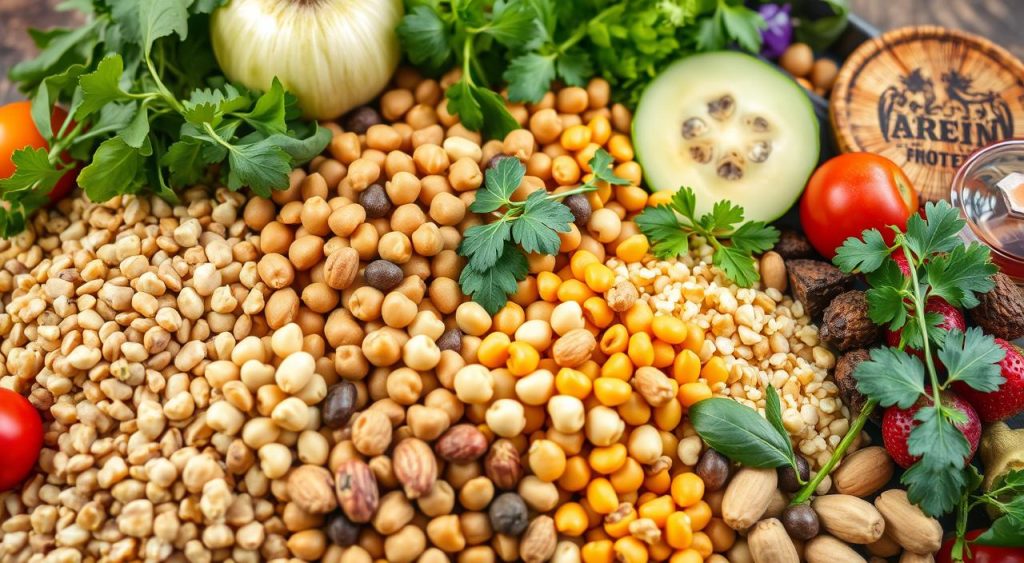
How to Incorporate More Plant Proteins Into Your Diet
Adding more plant proteins to your diet might seem hard, but it’s easier than you think. Studies show that a plant-based diet can give you all the nutrients you need for health.
Meal Planning Tips
Start by planning your meals ahead of time. Make a weekly meal plan and a grocery list. Stick to it. Beans, lentils, and tofu are great plant protein sources. You can also add plant-based protein powders to your diet.
Simple Recipe Ideas
Here are some easy recipes to try:
- Lentil soup with whole grain bread
- Grilled tofu with roasted vegetables
- Quinoa salad with chickpeas and avocado
Shopping Guide
When buying plant-based proteins, check the labels. Look for products with less sugar, salt, and unhealthy fats. Brands like Amy’s Kitchen and Follow Your Heart are good choices. By following these tips, you can enjoy the benefits of plant proteins.
Athletic Performance and Plant-Based Proteins
Plant-based proteins offer many benefits, including for athletes. They help build and repair muscles, which is key for better performance. This makes them a great choice for athletes looking to improve.
Plant-based proteins can also help with improved recovery and enhanced endurance. They are full of antioxidants and nutrients that fight inflammation. Legumes, nuts, and seeds are some of the best sources for athletes.
Here are some key benefits of plant-based proteins for athletes:
- Increased muscle mass and strength
- Improved recovery time
- Enhanced endurance and stamina
- Reduced inflammation and oxidative stress
Plant-based proteins are a valuable part of an athlete’s diet. They help improve performance, reduce recovery time, and boost overall health. By adding them to their meals, athletes can see big improvements.
With the right mix of plant-based proteins and a balanced diet, athletes can reach their goals. Whether you’re a pro or just starting, plant-based proteins can help you perform better.
Conclusion: Embracing the Power of Plant-Based Nutrition
Plant-based proteins offer many benefits, from better heart health to weight control and fighting inflammation. Choosing plant-based proteins is a smart move for our health and the planet. It’s a way to improve our well-being and help the environment.
We’ve seen how plant-based proteins come from various sources and are rich in nutrients. They compare well to animal proteins. We’ve also cleared up myths and found easy ways to add more plant-based foods to our diets.
We urge you to try out different plant-based proteins and find recipes you love. Even small changes can make a big difference in your health and the planet. Let’s all move towards a healthier, greener future with plant-based nutrition.
FAQ
What are the common sources of plant-based proteins?
Legumes, beans, lentils, tofu, tempeh, and seitan are common plant-based proteins.
How do plant-based proteins differ from animal proteins in terms of nutritional composition?
Plant-based proteins have a different nutritional makeup than animal proteins. Some plant proteins lack certain amino acids. But, a varied plant-based diet can give us all the amino acids we need.
How does the absorption of plant proteins compare to animal proteins?
Studies show plant proteins are just as absorbed and used by our bodies as animal proteins. The absorption depends on the protein type and our digestive health.
What are the health benefits of switching to plant-based proteins?
Switching to plant-based proteins can improve heart health, help with weight management, and boost digestion. It can also reduce inflammation.
What is the environmental impact of choosing plant-based proteins?
Choosing plant-based proteins is better for the environment. Animal agriculture causes more greenhouse gas emissions, deforestation, and water pollution. Plant-based proteins are a greener choice.
How do plant-based proteins compare to animal proteins in terms of protein quality, cost, and environmental footprint?
Plant-based proteins have their own strengths and weaknesses. While some may seem “incomplete,” a varied diet can meet all amino acid needs. They also have a smaller environmental footprint than animal proteins.
What are some common myths about plant-based proteins?
Myths include worries about protein deficiency, taste, and texture issues, and the belief they’re less effective than animal proteins. Debunking these myths helps share the truth about plant-based proteins.
How can I incorporate more plant-based proteins into my diet?
Adding more plant-based proteins is easy with meal planning tips and simple recipes. A shopping guide can also help. Exploring different plant-based proteins can make your diet more varied and healthy.
How do plant-based proteins affect athletic performance?
Plant-based proteins offer benefits for athletes, like better recovery and endurance. Understanding their role in athletic performance can help athletes improve their diet for better fitness.

